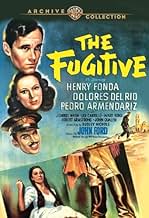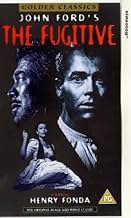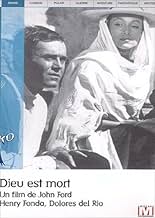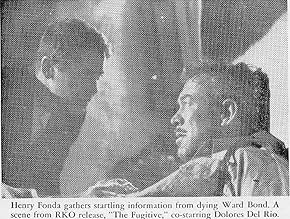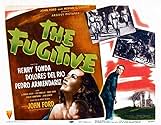IMDb रेटिंग
6.3/10
2.7 हज़ार
आपकी रेटिंग
अपनी भाषा में प्लॉट जोड़ेंAnti-Catholic and anti-cleric policies in the Mexican state of Tabasco lead the revolutionary government to persecute the state's last remaining priest.Anti-Catholic and anti-cleric policies in the Mexican state of Tabasco lead the revolutionary government to persecute the state's last remaining priest.Anti-Catholic and anti-cleric policies in the Mexican state of Tabasco lead the revolutionary government to persecute the state's last remaining priest.
- निर्देशक
- लेखक
- स्टार
- पुरस्कार
- 1 जीत और कुल 2 नामांकन
Dolores Del Río
- An Indian Woman
- (as Dolores Del Rio)
Pedro Armendáriz
- A Lieutenant of Police
- (as Pedro Armendariz)
Chris-Pin Martin
- An Organ-Grinder
- (as Cris-Pin Martin)
Miguel Inclán
- A Hostage
- (as Miguel Inclan)
Fernando Fernández
- A Singer
- (as Fernando Fernandez)
Rodolfo Acosta
- Policeman
- (बिना क्रेडिट के)
Mel Ferrer
- Father Serra
- (बिना क्रेडिट के)
Jack Pennick
- Man
- (बिना क्रेडिट के)
José Torvay
- Mexican
- (बिना क्रेडिट के)
फ़ीचर्ड समीक्षाएं
Move over, Harrison Ford; your namesake John got here first. While comparisons with Andrew Davis' action-packed 1993 thriller are inevitable in discussing 'The Fugitive (1947),' the two films aside from the similarity described in their shared title are completely unrelated, and about as different as two films could possibly be. Unlike many of the Westerns that brought director John Ford his greatest fame, 'The Fugitive' is entirely unconcerned with any form of action or dialogue; Ford's film-making is so concentrated on establishing the correct emotional atmosphere for each scene that it occasionally strays into tedium. However, it was obviously a very personal project for the Ford who once called it "perfect" and it's difficult to criticise a film into which the director poured so much passion and resolve. The story was adapted from Graham Greene's 1940 novel, "The Power and the Glory" {a.k.a. "The Labyrinthine Ways"} and concerns the plight of a victimised Christian priest, in an unnamed Latin American country where religion has been outlawed.
Perhaps the film's greatest weakness, from my reasoning at least, is that it is so concerned with painting each character as an icon or ideal (few characters are afforded names, and are instead credited with indefinite articles; "a fugitive," "a lieutenant of police," "an Indian woman") that it's hard to sympathise with them. Fortunately, while consistently attempting to maintain each character as a "timeless" figure in the film's ageless story, Dudley Nichols's screenplay avoids the usual stereotypes to which most amateur filmmakers would inevitably resort. The Fugitive (Henry Fonda) is not a courageous, humble pillar of human decency, but a misguided clergy driven by an unconscious self-pride; his adversary, the Lieutenant of Police (Pedro Armendáriz), loves his country and its people deeply, but, guided by a fierce blind patriotism and an illogical hatred of religion, he is often misled towards acts of sheer barbarity. The Police Informer (J. Carrol Naish) is a Judas-like character, betraying The Fugitive to the authorities, and becoming inescapably repentant at the thought of his inhumanity.
Despite not being particularly religious myself, I was sufficiently moved by Christianity's noble plight for survival, though I wasn't overly fond of the film's ultimate assertion that the lieutenant's hatred of religion stems directly from his secretly believing in God but being unwilling to admit it. Nevertheless, if you're going to watch 'The Fugitive,' it will most certainly be for the photography, which is, captured by Mexican cinematographer Gabriel Figueroa, indescribably breathtaking. The opening sequence, in which The Fugitive returns to his former church, the light streaking through the windows as though God himself is reaching into the forsaken depths of the building, is spellbinding in its beauty. While Armendáriz is charismatic, and even slightly sympathetic, in his role of the antagonist, Henry Fonda largely looks awkward in the lead role (though you could argue that this uneasiness is integral to his character), and most of the other players perhaps due to a language barrier are similarly stilted. A visual masterpiece this film may be, and certainly an overall interesting watch, but 'The Fugitive' remains inferior Ford.
Perhaps the film's greatest weakness, from my reasoning at least, is that it is so concerned with painting each character as an icon or ideal (few characters are afforded names, and are instead credited with indefinite articles; "a fugitive," "a lieutenant of police," "an Indian woman") that it's hard to sympathise with them. Fortunately, while consistently attempting to maintain each character as a "timeless" figure in the film's ageless story, Dudley Nichols's screenplay avoids the usual stereotypes to which most amateur filmmakers would inevitably resort. The Fugitive (Henry Fonda) is not a courageous, humble pillar of human decency, but a misguided clergy driven by an unconscious self-pride; his adversary, the Lieutenant of Police (Pedro Armendáriz), loves his country and its people deeply, but, guided by a fierce blind patriotism and an illogical hatred of religion, he is often misled towards acts of sheer barbarity. The Police Informer (J. Carrol Naish) is a Judas-like character, betraying The Fugitive to the authorities, and becoming inescapably repentant at the thought of his inhumanity.
Despite not being particularly religious myself, I was sufficiently moved by Christianity's noble plight for survival, though I wasn't overly fond of the film's ultimate assertion that the lieutenant's hatred of religion stems directly from his secretly believing in God but being unwilling to admit it. Nevertheless, if you're going to watch 'The Fugitive,' it will most certainly be for the photography, which is, captured by Mexican cinematographer Gabriel Figueroa, indescribably breathtaking. The opening sequence, in which The Fugitive returns to his former church, the light streaking through the windows as though God himself is reaching into the forsaken depths of the building, is spellbinding in its beauty. While Armendáriz is charismatic, and even slightly sympathetic, in his role of the antagonist, Henry Fonda largely looks awkward in the lead role (though you could argue that this uneasiness is integral to his character), and most of the other players perhaps due to a language barrier are similarly stilted. A visual masterpiece this film may be, and certainly an overall interesting watch, but 'The Fugitive' remains inferior Ford.
There are essentially two ways in which to view this movie.
The first one is to compare and contrast this film with the novel from which it is loosely inspired, "The Power and the Glory" by Graham Greene. This would unfortunately lead to disappointment and a poor understanding of John Ford's motives in making this movie. While the characters and situation are indeed taken from the book, The Fugitive is radically different, not just in the manner in which the main characters are treated, but more importantly, in the message it carries. While Greene's masterpiece described how even the most outwardly depraved and despicable of human beings can be redeemed by their last actions of faith and sacrifice, John Ford was more concerned with showing how circumstances may transform a cowardly priest into a martyr for the faith. While these two themes may be related, they reveal a difference in their respective author's world view and understanding of faith and redemption. It may be argued that the code of those days would not have permitted the showing of an alcoholic and adulterous priest on screen, but this would be misunderstanding the fundamental philosophy of John Ford, whose relatively conservative views in matters of morality would have recoiled at such an idea.
This brings us to the second way in which this movie can be enjoyed and appreciated, namely as John Ford's labour of love and guilty pleasure. It has been said that, of all the masterpieces he created with Henry Fonda and others, and there were many, The Fugitive was one of his all-time personal favorites, even though it was never a popular, nor critical success. Ford projected in his version of the story many of his personal trips regarding his faith. Allegories, and barely subtle Christ references abound in this movie, though never in a simple, nor trite manner. Rather, it is a beautifully-made story of a man's journey from fear and doubt to a better understanding of his role, no matter how modest, in the grand affairs of the world.
The photography is truly a work of art, masterfully using light and shadows, brightness and dark, close-ups of faces distorted by anguish and halos of figures resembling statues in church alcoves. Fonda's performance, always perfect, reaches new heights here. His mastery at containing emotions, while letting them seep through the audience, undiluted, gives this particular characterization extraordinary strength and complexity. It would have been tempting to interpret the priest as an almost static character, given the subject matter. Instead, while his priest was neither alcoholic, nor adulterous, he displays an even greater weakness and flaw of character: lack of faith, profound self-doubt and abject cowardice. His fears, doubts and anguish and his gradual descent into debasement, are in many ways more disturbing since they are in direct conflict with the sacrifices and moral strength demanded of a priest during religious persecution.
Dolores del Rio is magnificent in her Mary-Magdalena characterization, as Pedro Amendariz, superb as the perennial Judas torn by love, hate, jealousy, and fear. There is very little dialogue, and unlike many of Ford's movie, very little of the usual comic relief which often balances dramatic moments. Yet, there is never a dull or unnecessary scene.
John Ford has crafted in this movie something better than a faithful rendition of "The Power and The Glory". Indeed, The Fugitive is a beautiful, heartfelt story about humanity's frailty and its struggle to find strength and redemption in times of crisis. In this sense it is after all a wonderful tribute to Graham Greene's novel.
The first one is to compare and contrast this film with the novel from which it is loosely inspired, "The Power and the Glory" by Graham Greene. This would unfortunately lead to disappointment and a poor understanding of John Ford's motives in making this movie. While the characters and situation are indeed taken from the book, The Fugitive is radically different, not just in the manner in which the main characters are treated, but more importantly, in the message it carries. While Greene's masterpiece described how even the most outwardly depraved and despicable of human beings can be redeemed by their last actions of faith and sacrifice, John Ford was more concerned with showing how circumstances may transform a cowardly priest into a martyr for the faith. While these two themes may be related, they reveal a difference in their respective author's world view and understanding of faith and redemption. It may be argued that the code of those days would not have permitted the showing of an alcoholic and adulterous priest on screen, but this would be misunderstanding the fundamental philosophy of John Ford, whose relatively conservative views in matters of morality would have recoiled at such an idea.
This brings us to the second way in which this movie can be enjoyed and appreciated, namely as John Ford's labour of love and guilty pleasure. It has been said that, of all the masterpieces he created with Henry Fonda and others, and there were many, The Fugitive was one of his all-time personal favorites, even though it was never a popular, nor critical success. Ford projected in his version of the story many of his personal trips regarding his faith. Allegories, and barely subtle Christ references abound in this movie, though never in a simple, nor trite manner. Rather, it is a beautifully-made story of a man's journey from fear and doubt to a better understanding of his role, no matter how modest, in the grand affairs of the world.
The photography is truly a work of art, masterfully using light and shadows, brightness and dark, close-ups of faces distorted by anguish and halos of figures resembling statues in church alcoves. Fonda's performance, always perfect, reaches new heights here. His mastery at containing emotions, while letting them seep through the audience, undiluted, gives this particular characterization extraordinary strength and complexity. It would have been tempting to interpret the priest as an almost static character, given the subject matter. Instead, while his priest was neither alcoholic, nor adulterous, he displays an even greater weakness and flaw of character: lack of faith, profound self-doubt and abject cowardice. His fears, doubts and anguish and his gradual descent into debasement, are in many ways more disturbing since they are in direct conflict with the sacrifices and moral strength demanded of a priest during religious persecution.
Dolores del Rio is magnificent in her Mary-Magdalena characterization, as Pedro Amendariz, superb as the perennial Judas torn by love, hate, jealousy, and fear. There is very little dialogue, and unlike many of Ford's movie, very little of the usual comic relief which often balances dramatic moments. Yet, there is never a dull or unnecessary scene.
John Ford has crafted in this movie something better than a faithful rendition of "The Power and The Glory". Indeed, The Fugitive is a beautiful, heartfelt story about humanity's frailty and its struggle to find strength and redemption in times of crisis. In this sense it is after all a wonderful tribute to Graham Greene's novel.
I was attracted to this movie because of Henry Fonday, Dolores del Rio, and John Ford, all of whom I'm a fan. But this movie was just so WEIRD. From the start, I felt like I had joined the movie in the middle. The dramatic music along the walk and as he enters the church - it feels like a crucial point in a movie, but we don't even know what's going on yet. There are long periods with no dialogue, almost has the feel of a silent movie at times.
I found the whole movie depressing without any redeeming character development that would have made me sympathize with the characters. Why is Fonda, a white priest, even in this country in the first place? It's never explained. And he lets everyone take the fall for him. He's not likable or relatable in any way to me.
I found the whole movie depressing without any redeeming character development that would have made me sympathize with the characters. Why is Fonda, a white priest, even in this country in the first place? It's never explained. And he lets everyone take the fall for him. He's not likable or relatable in any way to me.
Graham Greene is one of the literary greats, and while the book 'The Power and the Glory' that 1947's 'The Fugitive' is based on is not one of my favourites of his and one can totally see why it was controversial at the time it is an interesting read. John Ford was a truly fine director, one of the best at that time, known for some of the finest Westerns around and he excelled too in non-Westerns (i.e. 'The Quiet Man'). The cast is an interesting one, Henry Fonda being the best known.
'The Fugitive' adaptation-wise is a loose one, and the censorship the film had to endure dilutes the impact somewhat. Two of the biggest differences being Fonda's character being no longer being an alcoholic and the central relationship not being sexual, which if included would have the film quite bold. If included though, it would have made it as divisive as the book. On its own terms, 'The Fugitive' didn't wow me and the potential was there for it to have been a much better film. But it was still not bad at all, actually thought that it was quite good, and there are a fair share of note-worthy good elements.
Coming off best of the many good things is Gabriel Figueroa's outdoor photography. Which is really quite miraculous, so many of the shots leave one in wonder in their beauty and varied technical skill. Oh and the outdoor locations are just stunning. The haunting score doesn't feel too constant or in your face, having the right mood throughout while not over-emphasising too much. Ford does show frequently how great he was as a director, at its best his direction here in 'The Fugitive' is quite masterly.
Some very thoughtful and powerful moments in the script and enough of the story compels and moves. The performances are very good, with a smouldering Dolores Del Rio (though she does have moments where she overacts) and a remarkably nuanced Fonda in a complex role being generally strong. The best performance comes from a both menacing and tortured Pedro Armendariz, who is riveting whenever he appears.
On the other hand, too much of the writing is very melodramatic to an over-cooked degree, as is Del Rio at times. Some of the pace is a bit draggy.
Do agree with those that say that the religious element of the story is very heavy-handed and at times vague. It is focused on too much and it is delivered with little subtlety, the messaging was done in a way that made me feel beaten around the head.
All in all, a lot of note-worthy things but flawed. One of those "appreciated what it tried to do" sort of films while not properly loving it, the divisiveness in opinions is understandable. 6.5/10
'The Fugitive' adaptation-wise is a loose one, and the censorship the film had to endure dilutes the impact somewhat. Two of the biggest differences being Fonda's character being no longer being an alcoholic and the central relationship not being sexual, which if included would have the film quite bold. If included though, it would have made it as divisive as the book. On its own terms, 'The Fugitive' didn't wow me and the potential was there for it to have been a much better film. But it was still not bad at all, actually thought that it was quite good, and there are a fair share of note-worthy good elements.
Coming off best of the many good things is Gabriel Figueroa's outdoor photography. Which is really quite miraculous, so many of the shots leave one in wonder in their beauty and varied technical skill. Oh and the outdoor locations are just stunning. The haunting score doesn't feel too constant or in your face, having the right mood throughout while not over-emphasising too much. Ford does show frequently how great he was as a director, at its best his direction here in 'The Fugitive' is quite masterly.
Some very thoughtful and powerful moments in the script and enough of the story compels and moves. The performances are very good, with a smouldering Dolores Del Rio (though she does have moments where she overacts) and a remarkably nuanced Fonda in a complex role being generally strong. The best performance comes from a both menacing and tortured Pedro Armendariz, who is riveting whenever he appears.
On the other hand, too much of the writing is very melodramatic to an over-cooked degree, as is Del Rio at times. Some of the pace is a bit draggy.
Do agree with those that say that the religious element of the story is very heavy-handed and at times vague. It is focused on too much and it is delivered with little subtlety, the messaging was done in a way that made me feel beaten around the head.
All in all, a lot of note-worthy things but flawed. One of those "appreciated what it tried to do" sort of films while not properly loving it, the divisiveness in opinions is understandable. 6.5/10
Hmmm, let's see... we've got a movie about a Catholic priest trying to exercise his ministry in a Latin American country whose government has been taken over by an anticlerical revolutionary party,... he administers the sacraments to the devoutly believing people while trying to stay one step ahead of the law, which has hunted down every other priest in the country,... what do you this movie will be like?
In the hands of the crusty but sentimental John Ford, you might expect this movie to be some kind of hagiography, showing the priest as he performs his pastoral labors with fierce courage as well as with patient devotion, and anticipates his fate with Christian resignation. (This would be particularly apt if Pat O'Brien or Spencer Tracy played the priest.) You might also expect the people he serves will be portrayed as simple God-fearing people with stout hearts and no illusions about the true intentions of their political leaders. The government and its agents will be portrayed as cruel and cynical tyrants, ever ready to beat on the simple folk in the name of the greater good.
Fortunately, this is not the movie that Ford made. The actual movie is a good deal more complicated (and much, much better) than that. This is a balanced, intelligent account of a tragic situation born of centuries of misrule and oppression by tyrannical government working, sad to say, hand in glove with the Church that is supposed to comfort the afflicted and afflict the comfortable. Pedro Amendariz in particular gives a great performance as the revolutionary government official, who, whatever his opinions may be, passionately loves his country, and sincerely wants the best for his beleaguered people. Henry Fonda, as the priest, gives at one point a stunning assessment of his motives for what he does which turns any picture of a heroic shepherd on its ear.
This is one of John Ford's lesser known pictures - an unknown masterpiece.
In the hands of the crusty but sentimental John Ford, you might expect this movie to be some kind of hagiography, showing the priest as he performs his pastoral labors with fierce courage as well as with patient devotion, and anticipates his fate with Christian resignation. (This would be particularly apt if Pat O'Brien or Spencer Tracy played the priest.) You might also expect the people he serves will be portrayed as simple God-fearing people with stout hearts and no illusions about the true intentions of their political leaders. The government and its agents will be portrayed as cruel and cynical tyrants, ever ready to beat on the simple folk in the name of the greater good.
Fortunately, this is not the movie that Ford made. The actual movie is a good deal more complicated (and much, much better) than that. This is a balanced, intelligent account of a tragic situation born of centuries of misrule and oppression by tyrannical government working, sad to say, hand in glove with the Church that is supposed to comfort the afflicted and afflict the comfortable. Pedro Amendariz in particular gives a great performance as the revolutionary government official, who, whatever his opinions may be, passionately loves his country, and sincerely wants the best for his beleaguered people. Henry Fonda, as the priest, gives at one point a stunning assessment of his motives for what he does which turns any picture of a heroic shepherd on its ear.
This is one of John Ford's lesser known pictures - an unknown masterpiece.
क्या आपको पता है
- गूफ़When the Priest is on line getting ready to board a ship, he is approached by a young boy that was baptized by him. The boy informs him that his mother is dying and wishes for the priest to come home with him to give her the last rites. What is not explained is how did the boy just happen to know that the priest was in town and getting ready to board a ship at that precise moment and in the third class section.
- भाव
A Lieutenant of Police: [Looking at news clipping] You can tell he's a priest by the collar, that's all.
A Chief of Police: Not a very good picture, but it's what we got.
A Lieutenant of Police: They all look alike to me. I've shot him a dozen times.
- साउंडट्रैकBury Me Not on the Lone Prairie
("The Dying Cowboy") (uncredited)
American folk ballad based on an older sea song (1932)
Variation heard as theme for the Gringo (Ward Bond)
टॉप पसंद
रेटिंग देने के लिए साइन-इन करें और वैयक्तिकृत सुझावों के लिए वॉचलिस्ट करें
- How long is The Fugitive?Alexa द्वारा संचालित
विवरण
बॉक्स ऑफ़िस
- बजट
- $15,00,000(अनुमानित)
- चलने की अवधि1 घंटा 44 मिनट
- रंग
- पक्ष अनुपात
- 1.37 : 1
इस पेज में योगदान दें
किसी बदलाव का सुझाव दें या अनुपलब्ध कॉन्टेंट जोड़ें


